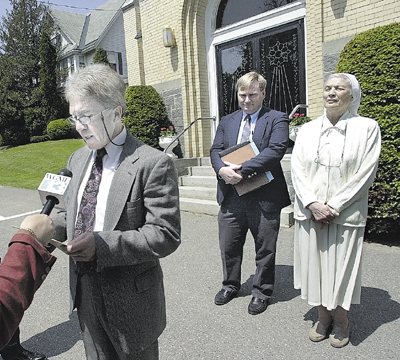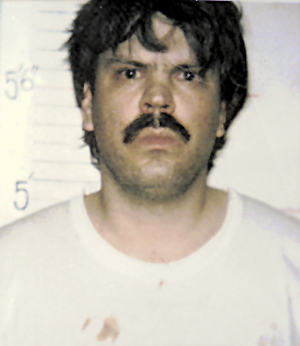AUGUSTA — The man who was committed to a state psychiatric hospital after killing two nuns and severely injuring two others in a chapel in Waterville in 1996 will be allowed to move into a new group home in a residential neighborhood.
Mark Bechard, 53, has to move because the group home he’s living in — on the former grounds of the Augusta Mental Health Institute — will close because of funding shortages.
State officials say that leaves Bechard with two options: move into a group home in the community or return to the Riverview Psychiatric Center, which also is on the former AMHI grounds.
Patients from the state campus homes that are closing are being moved to a home on Glenridge Drive, across Hospital Street from the grounds, or to Green Street, on Augusta’s West Side.
After several hours of testimony Friday from psychiatrists and others who are involved in Bechard’s treatment, Justice Nancy Mills approved his petition to move to the group home at 14 Glenridge Drive. The home is expected to open in a couple of weeks.
Mills denied a request that Bechard be allowed as much as three hours a day of unsupervised time in the community. Instead, he will be under 24-hour, seven-day-a-week staff supervision, at the home and whenever he leaves the property.
Mills said the transfer is an interim order, and she wants to revisit the issue after Bechard has had time to adjust to his new surroundings and housemates. “Until he gets through this period, he should be supervised,” she said.
The state is closing the group homes on the state campus at least in part because patients there have been deemed by the federal government to be ineligible for Social Security and other benefits, said Dr. William Nelson, medical director at Riverview. The federal government still considers them to be hospitalized because they’re on Riverview property. Once they are off the state campus, they will regain eligibility.
Nelson said while clients’ immediate needs for food and housing would still be met if they stayed on state property, their lack of discretionary money could hurt their recovery.
Authorities say Bechard, who was 37 at the time, was suffering a psychotic episode when he stormed through the chapel at the Servants of the Blessed Sacrament convent in Waterville on Jan. 27, 1996. He attacked four nuns, killing Mother Superior Edna Mary Cardozo, 68, and Sister Marie Julien Fortin, 67.
Sister Patricia Ann Keane survived the attack but died later from her injuries. Sister Mary Anna DiGiacomo, who was paralyzed on her right side, died in 2006.
A nun who answered the phone at the convent Friday said state officials had told them about Bechard’s petition to move, but they didn’t attend the hearing and don’t want to comment.
Bechard was found not criminally responsible for the deadly rampage and was committed to state custody. Since then, he has been on antipsychotic medication.
Ann LeBlanc, director of the state Forensic Service, said Bechard has been reliable in following his treatment plan and has shown no signs of being a risk to his own or the public’s safety in at least five years.
Bechard has been diagnosed with schizo-affective disorder, according to Dr. Mitchell Manin, Bechard’s psychiatrist at Riverview. The disorder is characterized by a combination of symptoms of schizophrenia and a mood disorder, according to the National Alliance on Mental Illness.
Bechard spoke only once during his petition hearing Friday in Kennebec County Superior Court, saying “thank you” when Mills said she hopes it goes well for him in the new group home.
Richard Weiss, executive director of Motivational Services, the nonprofit organization that will run the home, said it will house eight clients and be staffed at all times by at least two people, sometimes four.
Its doors will not be locked, but if anyone goes through the main door, beepers worn by staff members will buzz so they will be alerted, Weiss said.
The only other doors at the home will be fire doors, and opening them will set off a fire alarm. Windows in the clients’ bedrooms will have screens with alarms.
The home will be about 500 feet from a nursing home and a day-care center. A large apartment complex is farther down the dead-end road.
Bechard apparently has been allowed at least some unsupervised time away from his current group home. Manin said Bechard has been dropped off by a staff member for a Sunday jazz brunch at a breakfast spot, where he spent about an hour listening to music before being picked up.
Augusta Deputy Police Chief Jared Mills attended Friday’s hearing but did not speak. He said he attended to hear what sort of conditions Bechard will have, and so police will be informed on the issue.
Bechard moved out of Riverview and into a group home after a successful court petition in 2010. Officials said the only other option for Bechard was readmission to Riverview.
Kennebec Journal Staff Writer Keith Edwards can be contacted at 621-5647 or at:
kedwards@centralmaine.com
Send questions/comments to the editors.






Comments are no longer available on this story